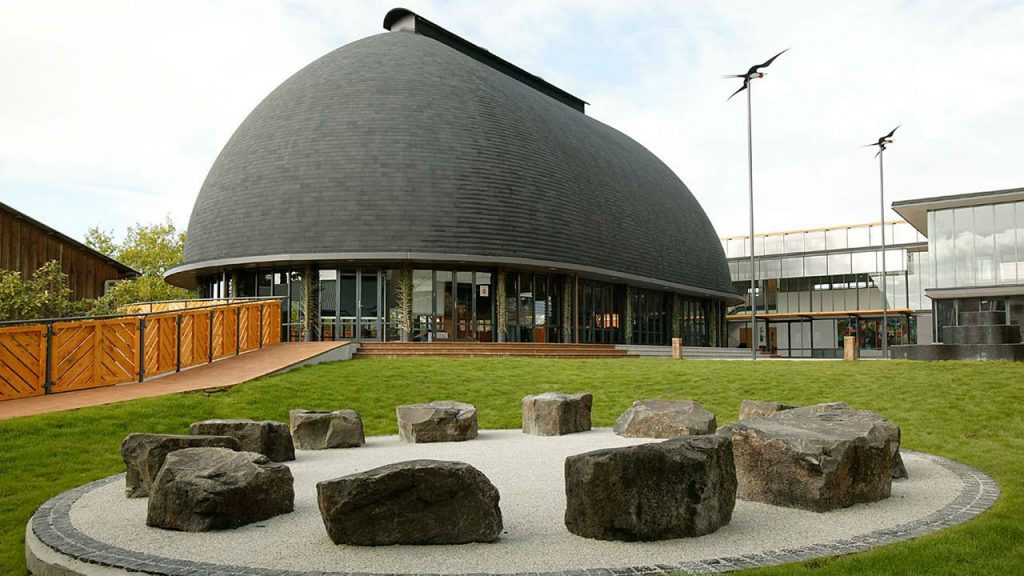
The university's Fale Pasifika: the Pacific sense of self thrives on interaction, closeness, and connection. IMage supplied by University of Auckland
More than five weeks into lockdown and the nation doesn’t quite feel the same; queuing outside supermarkets, two-metre distancing, and keeping to your isolation bubble have become the norm.
‘Bubble’, a word used in association with childhood, fun and playfulness takes a different tone. It now refers to isolation and the distance away from familiar arms that uphold your wellbeing and mana: the social spaces enmeshed in your culture and identity; the arms of your aiga (family), your lotu (church), your aoga (school) or even your faiaoga (teacher).
Social distancing has become a frequently used term to frame our nation’s collective commitment to eradicate Covid-19, which has moved schools and universities to online teaching.
It seems this type of teaching has become a global and national response to the ‘business as usual’ philosophy of education, the idea being that as long as teaching can be delivered online, students can continue learning.
Online teaching in the current context of social distancing prescribes a particular image of the student and raises tensions for Pasifika peoples, as the Pacific sense of self is defined in relation to others and thrives on interaction, closeness, and connection.
While I am not entirely opposed to it, I’m concerned online teaching is being portrayed as a standard and universal solution. For it to be effective, there are underlying assumptions about learning conditions which are not realistic for all, particularly at a time of global pandemic.
Not everyone has food on the table, a steady and stable income or a physical space within the home to study uninterrupted, let alone full access to reliable devices and broadband. Therefore, we can’t assume it will be equitable and accessible for all; which is why the Ministry of Education has developed teaching resources and materials for national distribution in homes. But is this enough?
For many Pasifika families, the family as a nuclear structure is not so clear cut; there is a blurring of lines between generations, aunties, uncles, grandparents and cousins living under one roof. The complexity of negotiating your bubble within an extended family context adds another layer to navigate for both Pasifika teachers and academics, as well as students engaging online. I’ll summarise what one of my Pasifika students said about the live-streaming of class videos:
“When we’re invited to join Zoom, we open our homes to you, the viewer. Our home is our vā, our sacred space.”
This has stayed with me over the past few weeks as I have adapted modes of teaching online that are more conducive to the vā (relational time/space) of our Pasifika students. In these moments, I am reminded that there is no one ‘univocal’ Pasifika or Pacific story, and no universal approach that will mend the so-called disparities of Pasifika education success.
This is no ‘one size fits all’ narrative although Pasifika statistics in education continue to tell a one-sided deficit story. I’m tired of the deficit theorising that positions Pasifika peoples as underachieving in education, when the story presented does not challenge the hidden agendas of education, such as confronting ‘whose knowledge is silenced in education and why?’
The power of Pasifika peoples’ stories have an enduring reach and are written, sung, danced, carved, woven, tattooed and chanted. These stories express resilience, innovations, knowledge systems, history, spirit and life, interconnected and incessant.
The vā, as a relational sphere when applied to the teaching and learning environment, becomes a conduit for story creation, storytelling and story reimagining. In education, the power of story connects teaching and learning, content to context, being to knowing, genealogy to history, politics to power and the human to non-human life.
The jolt in education delivery due to Covid-19 has forced us to stop, listen, question and re-evaluate the work-study-life-(un)balance which has long been taken for granted. I wonder how this re-evaluation will be taken up in the context of education policy and practice?
Will there be a new, reimagined Pasifika education story that speaks to the strength of Pasifika peoples beyond the conversation about equity? Pacific Indigenous philosophy opens other ways of being in education, offers us alternatives to think differently about our relationships with people, places, time and space.
Now at Level 3, the dust has settled slightly and a story-within-a-story emerges in the residue. I’ll share a personal example. My youngest son’s online task was to learn the Samoan days of the week.
My son engages teu le vā, (which means ‘to nurture the relationship’ in Samoan), with his grandmother in which he learns more than just pronunciation or that the day of the week translates to Monday. Grandmother explains, “Aso gafua is the day when the Matai would meet together in our village, that’s how I remembered it is Monday and you will remember too.”
This is valuable learning for my son; a story that will hold him secure in the arms of his aiga and nu’u (village). Pasifika peoples have long valued education, however, does education value Pasifika peoples? At this time, let us pause and reflect on the reach of our stories, to reimagine a new story of Pasifika education.
Jacoba Matapo is of Samoan and Dutch heritage and was born and raised in Aotearoa New Zealand.
A new report from the University of Auckland’s Our Voices Project asks young people what…
The government has opened a tender for new standardised assessment tests, leaving educators shocked and…
Early in her career, Kiri Turketo found inspiration in an unlikely source. In this Principal…
Real stories of dedication, challenges, and triumphs from educators in NZ. Part six comes from…
Is fast furniture impacting your school's environmental footprint? We explore eco-friendly solutions to reduce furniture…
A new report from the New Zealand Initiative argues we need a stronger and clearer…
This website uses cookies.